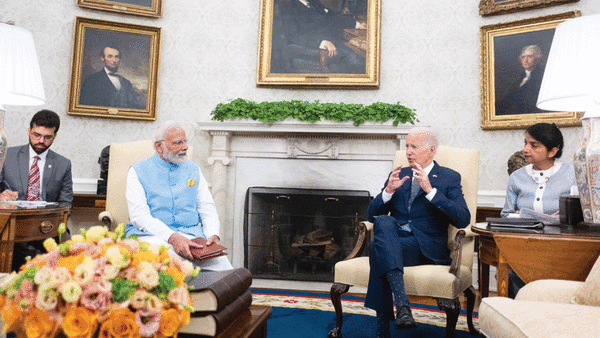

President Joe Biden emphasised common ground with Prime Minister Narendra Modi of India during a lavish state visit, publicly skirting points of friction over the government’s crackdown on human rights in India and Russia’s war in Ukraine in hopes of bolstering economic and geopolitical ties with the world’s most populous nation.
Biden treated Modi to a day of red-carpet pageantry and showered him with expansive flattery as he sought to draw India closer at a time when the United States finds itself locked in open conflict with Moscow and in an uneasy standoff with China. But even as the leaders announced a range of initiatives, they made no evident progress resolving the disagreements that have strained the relationship in recent months.
The visit’s most surprising breakthrough was a modest if notable one as Biden coaxed Modi into taking questions from reporters at a joint news conference, one of the rare times the nationalist prime minister has done so in his nearly decadelong tenure. Challenged on his record on human rights and freedom, Modi insisted that democracy is “in India’s DNA” and denied that his government has fostered prejudice in serving its people.
“Democracy is our spirit. Democracy runs in our veins. We live democracy,” Modi said as Biden watched in the East Room of the White House. “In India’s democratic values, there’s absolutely no discrimination neither on basis of caste, creed or age, or any kind of geographic location,” Modi added, even as demonstrators outside the White House gates protested the crackdown on dissent back in India.
Although Biden shied away from criticism of India’s democratic backsliding, he stood by his characterisation of Chinese President Xi Jinping during a campaign fundraiser this week. Avoiding “the facts with regard to” China, he told reporters, “is just not something I’m going to change very much.” But he shrugged off the protests from Beijing, saying he still expected to meet with Xi later this year despite his remark. “I don’t think it’s had any real consequence.”
In cultivating Modi, Biden put aside his language about “democracy versus autocracy” being the defining struggle of his time. In his welcome remarks and the later appearance before reporters, Biden described the two countries as fellow democracies committed to universal values without directly mentioning the increasing suppression of minority groups and opposition voices in India.
In their moments before cameras together, Biden pronounced America’s partnership with India “the most consequential in the world.”
Modi offered no indication that he had changed his mind about Russia or China, much less about human rights at home. Indeed, during an address to a joint session of Congress after meeting with Biden, Modi avoided even using the words “Russia” and “China,” sticking to passive formulations.
“With the Ukraine conflict, war has returned to Europe,” he said, without saying who started the war. And he warned of “dark clouds of coercion and confrontation” that are “casting their shadow in the Indo-Pacific” without saying who was doing the coercing or the confronting.
Among other things, Modi pointedly noted that his country has grown from the world’s 10th-largest economy when he last addressed Congress in 2016 to the fifth largest today, almost as if determined to force the United States to see India as a near equal, not just an emerging power, but a great and rising one.
To mark their ties, the two leaders rolled out a long list of joint initiatives on telecommunications, semiconductors, artificial intelligence and other areas. Modi agreed to sign the Artemis Accords, a set of principles governing peaceful exploration of the moon, Mars and other celestial bodies, and the two announced a joint mission to the International Space Station in 2024. The United States and India will open additional consulates in each other’s country.
Among the most concrete agreements highlighted on Thursday was a deal between General Electric and the state-owned Hindustan Aeronautics Limited to manufacture in India F414 engines used to power the Boeing F/A-18E/F Super Hornet. The two sides also announced that India would proceed with a long-stalled $3 billion purchase of MQ-9B Predator drones from General Atomics.
The military hardware sales may help wean India off Russian arms suppliers. Biden administration officials suggested the meeting was just one step in an evolution of India’s stance on the Ukraine war, part of what they characterised as “bending the arc of India’s engagement.”
But Modi again stressed the need for “dialogue and diplomacy,” adding that “we are completely ready to contribute in any way we can to restore peace,” without condemning Russia’s unprovoked attack of a neighbouring country.
Biden made no effort in public to pressure Modi on the matter. Instead, he concentrated on cementing bonds, pointing to the prevalence of Indian Americans in prominent positions in Washington. “We see it here at the White House where proud Americans of Indian heritage serve our country every day — including our vice president of the United States, Kamala Harris,” he said, turning to Harris standing off to the side.
Harris, who will host Modi for lunch on Friday, traces her Indian background to her mother, who emigrated to the United States as a teenager. Biden cited the story of “a family like so many of ours in our nation that speaks to the thousands of stories of determination, courage and hope.”
Oman Observer is now on the WhatsApp channel. Click here



